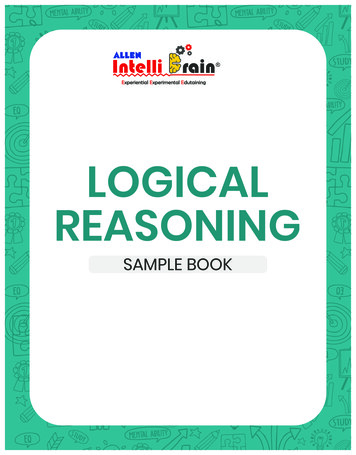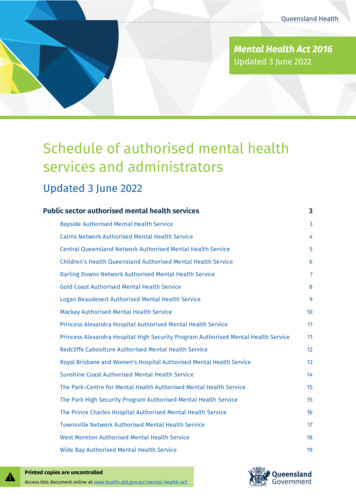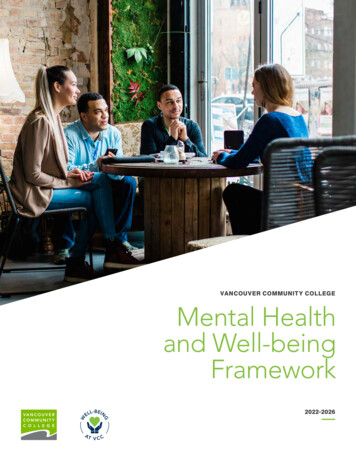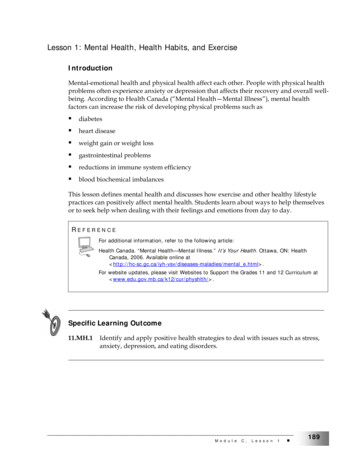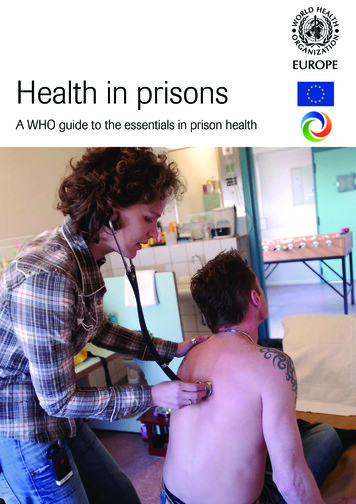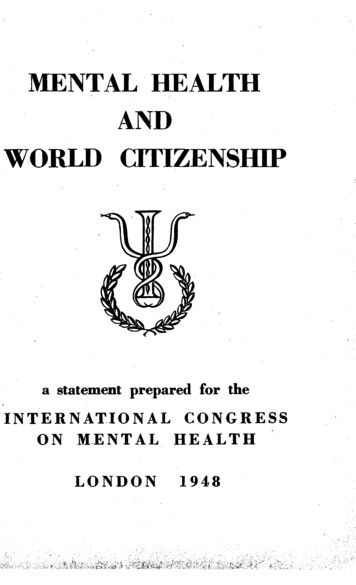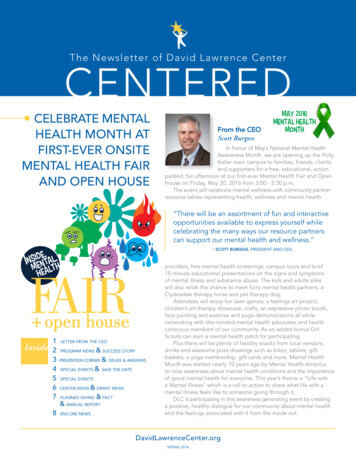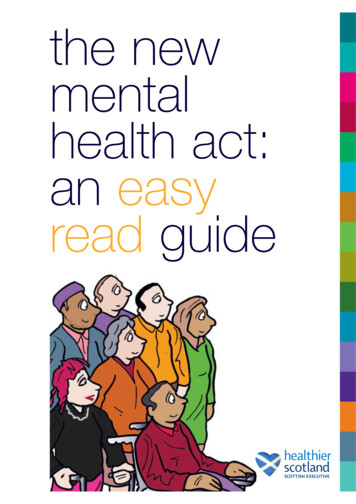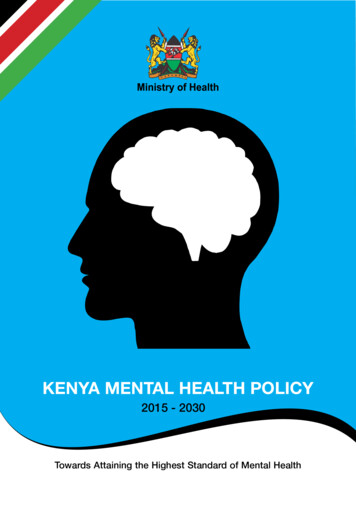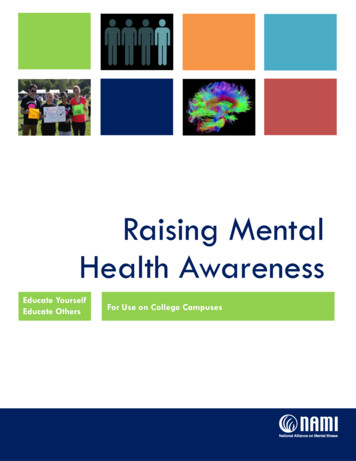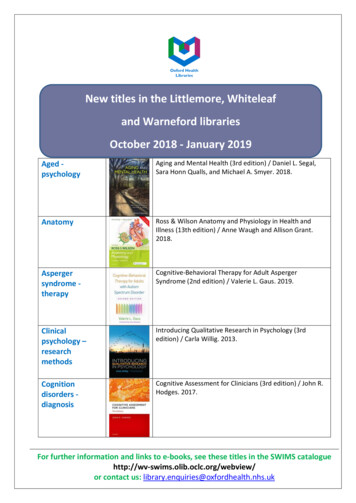
Transcription
WELL-BEING ANDMENTAL HEALTH INTHE GIG ECONOMYPolicy Perspectives on PrecaritySALLY-ANNE GROSSGEORGE MUSGRAVEand LAIMA JANCIUTECAMRI Policy Briefs 4
THE AUTHORSSALLY-ANNE GROSS is Principal Lecturer in Music BusinessManagement, School of Media, Arts and Design, University ofWestminster and a music manager. With George Musgrave sheauthored the two-part study nationwide study ‘Can Music MakeYou Sick?’.Dr GEORGE MUSGRAVE is Senior Lecturer in Music BusinessManagement, School of Media, Arts and Design, University ofWestminster and a musician. With Sally-Anne Gross he authoredthe two-part study nationwide study ‘Can Music Make You Sick?’.DR LAIMA JANCIUTE was Research Fellow of the PolicyObservatory at the Communication and Media Research Institute(CAMRI), University of Westminster.ABOUT CAMRICAMRI (the Communication and Media ResearchInstitute) at the University of Westminster is aworld-leading centre of media and communicationresearch. It is renowned for critical andinternational research that investigates the role ofmedia, culture and communication(s) in society.CAMRI’s research is based on a broader purpose and vision forsociety: its work examines how the media and society interact andaims to contribute to progressive social change, equality, freedom,justice, and democracy. CAMRI takes a public interest andhumanistic approach that seeks to promote participation, facilitateinformed debate, and strengthen capabilities for critical thinking,complex problem solving and creativity.camri.ac.uk
SERIES DESCRIPTIONThe CAMRI Policy Brief series provides rigorous and evidence-based policyadvice and policy analysis on a variety of media and communicationrelated topics. In an age where the accelerated development of mediaand communications creates profound opportunities and challenges forsociety, politics and the economy, this series cuts through the noise andoffers up-to-date knowledge and evidence grounded in original research inorder to respond to these changes in all their complexity.By using Open Access and a concise, easy-to-read format, this peerreviewed series aims to make new research from the University ofWestminster available to the public, to policymakers, practitioners,journalists, activists and scholars both nationally and I Policy Briefs (2018)Series Editors:Professor Steve BarnettProfessor Christian FuchsDr Anastasia KavadaNora KroegerDr Maria MichalisTHE ONLINE ADVERTISING TAX: A Digital Policy InnovationChristian FuchsARTIFICIAL INTELLIGENCE AND THE INTERNET OF THINGSMercedes Bunz and Laima JanciuteAPPEARANCE, DISCRIMINATION AND THE MEDIADiana Garrisi, Laima Janciute, and Jacob JohanssenWELL–BEING AND MENTAL HEALTH IN THE GIG ECONOMYSally-Anne Gross, George Musgrave and Laima JanciuteCAMRI extended policy report (2018)THE ONLINE ADVERTISING TAX AS THE FOUNDATION OFA PUBLIC SERVICE INTERNETChristian Fuchs
WELL-BEING ANDMENTAL HEALTH IN THEGIG ECONOMYPOLICY PERSPECTIVES ON PRECARITYSally-Anne Gross, George Musgrave andLaima JanciuteA CAMRI POLICY BRIEF
Published byUniversity of Westminster Press115 New Cavendish StreetLondon W1W 6UWwww.uwestminsterpress.co.ukText Sally-Anne Gross, George Musgrave and Laima JanciuteFirst published 2018Cover: ketchup-productions.co.ukDigital versions typeset by Siliconchips Services Ltd.ISBN (Paperback): 978-1-911534-89-1 (not available for sale)ISBN (PDF): 978-1-911534-90-7ISBN (EPUB): 978-1-911534-91-4ISBN (Kindle): 978-1-911534-92-1DOI: https://doi.org/10.16997/book32Series: CAMRI Policy BriefsISSN 2516-5712 (Print)ISSN 2516-5720 (Online)This work is licensed under the Creative Commons Attribution-NonCommercialNoDerivatives 4.0 International License. To view a copy of this license, 4.0/ or send a letter to Creative Commons, 444 Castro Street, Suite 900, Mountain View, California, 94041,USA. This license allows for copying and distributing the work, providingauthor attribution is clearly stated, that you are not using the material forcommercial purposes and that modified versions are not distributed.The full text of this book has been peer-reviewed to ensure high academic standards. For full review policies, see: mpeting InterestsThis research on which this Policy Brief is founded was commissioned by HelpMusicians UK (Registered charity number 228089). The commissioners had acollaborative role in the design of the study, however, had no role in: the conduct of the study; the collection, analysis and interpretation of data; the decisionof the submission of the manuscript; or in the preparation, review or approval ofthe manuscript. The views expressed here are those of the authors and not thoseof the commissionersSuggested citation:Gross, Sally-Anne, Musgrave, George and Janciute, Laima. 2018 Well-Being andMental Health in the Gig Economy: Policy Perspectives on Precarity. London: University of Westminster Press. DOI: https://doi.org/10.16997/book32.License: CC-BY-NC-ND 4.0To read the free, open access version of this bookonline, visit https://doi.org/10.16997/book32 orscan this QR code with your mobile device:
CONTENTSKey Messages 4What’s the Issue? 7Research Evidence 12Financial Instability 15The Feedback Economy 16Relationships 17Review of Policy Options 20Increasing Tax for the Self-Employed 20Policy Recommendations A Universal Basic Income Education is Key Access to Mental Health Support 22222425Notes 26Sources and Further Reading 31
WELL-BEING AND MENTAL HEALTHIN THE GIG ECONOMYL Key MessagesThis policy brief provides research evidence into the working conditions of the UK music industry that i ndicatesthe necessity to consider the future of work not only froman economic or employment law perspective, but alsoin terms of wider societal implications that include thehealth and well-being of workers.In the last d ecade or so, casual, short-term forms of employment have increased significantly. This development hasbeen linked to deindustrialisation and, more generally to theexpansion of neoliberal economics globally1. These changeshave had a significant impact on labour relations as employers have moved away from offering long-term employment contracts favouring instead ‘flexible’ and freelance work,often based on zero-hours/on-demand contracts.This mode of employment is now commonly referred toas the gig economy. These working conditions are oftendescribed as being particular to the so-called digital economyand its underlying business models. However, long beforethe arrival of the internet there certainly have been manyindustries that relied on this ‘work for hire’ model such asthe building trade, agricultural work and many of the skilledtrades including areas of cultural labour. However, the creative industries are indeed characterised by these workingconditions, where self-employment and short-term projectbased work have been the norm for decades2.
WELL-BEING AND MENTAL HEALTH IN THE GIG ECONOMYThe research which informs this policy brief suggests thatgiven the expansion of this type of short-term employment,it is important to understand how these working conditionsimpact on self-employed workers, their families and widersociety. This research suggests that: Working within these precarious conditions of employment may have psychologically harmful effects. Key issues raised by musicians are: financial instability, the requirement to maintain an online presence andnetwork which exposes individuals to relentless opinionand criticism, and the ambiguity of relationships in themusic economy with blurry boundaries between friendships and work relationships.Based on the research evidence of the potential harmfuleffects that precarious employment conditions may have onthe individuals working in it, this policy brief makes the following recommendations: The sector of freelance and/or creative self-employmentneeds to establish health and safety regulations likethose that exist in other institutionalised workplaces. In order to counter the issues caused by the gig economy,the government should act against the spread of precarious working conditions and promote fair businessmodels.5
6CAMRI POLICY BRIEFS Instead of increasing financial and/or administrativeburdens placed on the self-employed, the governmentshould design policies that provide support to workersin the gig economy. A universal basic income scheme would enable selfemployed workers to meet their essential needs whilestaying in their profession. Fostering knowledge about mental health amongstworkers in the gig economy would enable them to takeappropriate action when faced with mental health issues. Improving access to mental health support for selfemployed people – with a particular focus on stress andanxiety management – is vital.
b WHAT’S THE ISSUE?The expansion of the so-called gig economy, where flexible patterns of employment prevail in contrast to permanent jobs,is causing numerous issues. The UK Government’s inquiry intoEmployment Practices in the Modern Economy is a much-neededinitiative in response to this trend: the number of self-employedworkers in Britain has increased by 1 million between 2008 and20153, while so-called ‘zero-hours contracts’ have also reached arecord high4. The transformation in British labour relations andthe departure from traditional forms of employment is part ofa global trend that has emerged as a result of new technologyenabled business models. This trend is exemplified in the digitaleconomy and the decrease in full-time long-term job offers overthe last decade or so. Indeed, according to the Office for NationalStatistics’ most recent report on self-employment: ‘the numberof self-employed reporting themselves as working on their own,or with a partner but no employees, has increased between 2001and 2016, while those who report themselves as having e mployeeshas fallen over the same period’5. This mirrors the conditionsfrequently found within the music sector. Apart from the increasein earlier forms of flexible work, such as part-time employment or
8CAMRI POLICY BRIEFSfixed-term contracts, new patterns of atypical work contracts and‘on demand’ work have also proliferated6.Work is increasingly being carried out on online platforms connecting buyers and sellers, or by large projectteams across borders and time zones [. . .] Active labourmarket policies are needed to cater for the changing reality in the world of work. This concerns social securitysystems, which must adapt to new, constantly changing,requirements7.These shifts have given rise to tensions around access to highquality essential services by workers of the gig economy. Theseinclude issues such as whether social protection is adequate andsustainable, whether working conditions are fair, whether there isa balance between flexibility and security elements, and what andhow high the risks are for both workers and employers8. Whileself-employment is seen as key for economic recovery, i nnovationand competitiveness, ‘the relationship between self-employmentand social security has long been problematic, contested andcomplex’9. A recent BBC article reported on the struggle of a successful blogger and a single parent to qualify for tax creditsfor example10. This case demonstrates how the self-employed havealways been evaluated differently under benefit regulations whichmakes their claims for support more d ifficult. In the meantime,the UK Parliament’s Work and Pensions Committee stated in thecontext of its inquiry into the gig economy that the expansion ofself-employment in many cases is bogus and should be interpretedas the companies’ ‘free-riding on the welfare state’11.
WELL-BEING AND MENTAL HEALTH IN THE GIG ECONOMY9Some stakeholders and commentators, including online platforms-based companies, defend the gig economy and flexibleemployment as a reciprocally beneficial business model, andsay that it is only a ‘natural future of work’ – to be celebrated12.They also make claims that offering greater employment benefitswould result in less work, overall13. Whilst one could argue thatself-employment is a matter of choice, it has to be noted thatwithin the creative sector this model of employment is the norm.Although this may offer the self-employed workers a degree ofautonomy, it has always left them vulnerable to market changes14as well as changes in income tax and anomalies in social securitybenefits.The Uber drivers’ case brought to the Employment Tribunal15and other cases16 suggest that models of work with reduced socialsecurity guarantees are often not desirable from the workers’perspective. The recent UK Parliament Work and PensionsCommittee’s inquiry, mentioned above, concluded that the growth of the ‘gig economy’ might be used as a way to escapethe welfare state model and that self-employment is often abused.The need to reinforce workers’ rights in response to drasticchanges in the labour market that have led ‘to more temporaryjobs and more people being treated as independent contractors’17has also been seen internationally. The EU has just presented itsproposals addressing this issue18 (involving in many cases socialdumping and unfair competition)19.‘models of work with reduced social securityguarantees are often not desirable from theworkers’ perspective’
10CAMRI POLICY BRIEFSThose in favour of the gig economy emphasise the flexibility ofthis type of work. However, the reality for the workforce is morecomplex. For low paid self-employed workers, accessing benefits designed to encourage work – such as working tax creditsand housing benefits – can be frustratingly time consuming andoften futile20. Concerns that such working conditions are badfor workers in comparison to full-time workers in permanentemployment have been raised on various occasions. Even forhigher earning workers self-employment presents difficulties, forexample it can cause problems when obtaining financial referencesand/or statements for renting or mortgages and for other forms ofcredit which in turn has implications for their spending capacityand national growth. The sustainability of the business andwork models of the gig economy can thus be questioned. Thesetrends can be seen clearly in the study outlined below, whichalso highlights the potentially harmful effects of workingwithin precarious conditions of employment on workers’ mentalhealth.‘there is a necessity to consider the future ofwork not only from an economic or employmentlaw perspective, but also from a well-beingperspective too.’The research suggests that there is a necessity to consider thefuture of work not only from an economic or employment lawperspective, but also from a well-being perspective too. The research findings suggest the potential impact of the gig economynot only on workers’ earning potential, but also the potentiallynegative implication for their health and well-being.
WELL-BEING AND MENTAL HEALTH IN THE GIG ECONOMY11This policy brief draws particular attention to the impact onthe population’s mental health caused by precarious forms ofwork, such as those seen in the gig economy. The link betweenthe two has been observed in various sources21, and the evidencein this brief should be understood in the context of this existingscholarship.
M RESEARCH EVIDENCEA detailed insight into the potential links between precariousworking conditions such as those seen in the gig economy,and mental health is provided by the research findings fromthe study ‘Can Music Make You Sick? Working Conditions inthe UK Music Industry’, commissioned in 2016 by the charityHelp Musicians UK* and carried out by Sally-Anne Gross andDr George Musgrave.‘Can Music Make You Sick?’22 was the largest nationwide study ofits kind exploring the psychological impact on musicians of seeking to forge careers within the UK music industry. A survey ofover 2200 music industry stakeholders alongside thirty detailedqualitative interviews with artists and industry professionals,demonstrated that there are cripplingly high levels of self-reporteddepression (68.5%) and anxiety (71%) amongst music makers.Crucially, it also explores the source of their mental ill health. Theresearch suggests that the conditions of their self-employmentare often the cause of their psychological distress. This researchcan help to shed light on the conditions of self-employment inthe digital age. The music industry’s metaphor of the ‘canary in acoal mine’ was often used to describe the experience of the music
WELL-BEING AND MENTAL HEALTH IN THE GIG ECONOMY13i ndustries as they faced the technological challenges of the digitalera before other parts of the creative industries and in foreshadowing the future of working conditions in the wider economy moregenerally23. Therefore, the way these musicians psychologicallyexperience their self-employment has lessons for other and laterworkers in the gig economy.‘there are cripplingly high levels of self-reporteddepression (68.5%) and anxiety (71%) amongstmusic makers’.The focus of the research was to hear directly from musiciansabout their working conditions and how they felt these affectedtheir mental well-being. In this first phase, Music Tank, which ispart of the University of Westminster, launched an industry-widesurvey to ascertain the scale of the potential problem within this
14CAMRI POLICY BRIEFSworkforce. Comprised primarily of musicians, 2,211 respondentscompleted the initial survey. Next, the researchers interviewedthirty musicians from across the United Kingdom with thefollowing characteristics: An even gender split. A wide variety of musical genres (including Pop, Soul,Jazz, Urban, Reggae, Classical, Rock, Dance, Folk,Opera, Dubstep and Musical Theatre). Proportionate geographical spread: (London [50%],Manchester [10%], Newcastle [8%], Bristol [8%], Birmingham [8%], Edinburgh [4%], Glasgow [4%], B elfast [4%], and Cardiff [4%]). Broad age ranges, and stages in their careers (from a rtistsjust starting out to long established professionals).Alongside this, five supplementary interviews were carried outwith record label executives, music managers, and mental healthservice providers.Of the survey respondents, 68.5% reported suffering from depression and 71% from anxiety. These statistics suggest thatthese respondents were three times more likely than the generalpublic to suffer from these conditions24. Certainly, there is a popular conception of a musician as a ‘tortured artist’ and, anecdotally,this leads many to perhaps suspect numbers like this because, ‘ofcourse all artists are mad’. However, a crucial finding from thisresearch suggests that many musicians and music professionals
WELL-BEING AND MENTAL HEALTH IN THE GIG ECONOMY15locate the source of their mental ill health in the conditions oftheir career. Whilst some of our findings related to the specificstruggles and strains of a musical career, a number are equallyapplicable to other forms of insecure employment. Key pointssuggested by respondents included:Financial InstabilityFor many, the financial precariousness that characterises a careerin the music industry – based on varying levels of income, inconsistent contracts, and frequently working for free, is profoundly psychologically destabilising. The inability to turn whatappeared to be reasonable levels of perceived success into anyfinancial peace of mind deeply worries these workers. These kindsof concerns stem at least in part from the inability to plan one’sfuture: as one explained ‘not quite being able to set goals that areconcrete means it’s hard to plan’ (Folk singer, Cardiff). For many,this means prolonged periods of time living in unstable rentalaccommodation or having to live at a parental home. It also meansworrying month to month about being paid on time as paymentfor invoices was late, or even not finding any paid work at all.‘The inability to turn what appeared to bereasonable levels of perceived success into anyfinancial peace of mind deeply worries theseworkers.’This creates what is, for many, seen as a kind of extended adolescence where they struggle to achieve crucial markers ofadulthood, which in turn harms their self-esteem, leading to profound feelings of both anxiety and depression. Musicians spoke
16CAMRI POLICY BRIEFSof seeing their peers achieving crucial ‘life goals’ such as buyinghouses, getting married, and going on holidays, and their creepingsense of self-doubt leading to feelings of depression. Intervieweesoften described a ‘relentless’ pressure that they felt to stay afloat,which manifests itself in exhaustion, but also simultaneously,feelings of ‘guilt’ and anxiety about taking any time off.‘What might be thought of as liberation, isexperienced as detachment; flexibility as fragility;geographical mobility as placelessness orrootlessness; and the freedom of freelancingas anxiety.’To suggest that musicians struggle financially is of course notnew or novel. However, what the research findings of ‘Can MusicMake You Sick’ point towards, is a greater acknowledgementof the relationship between financial precarity and emotional instability. Indeed, the author whose work inspires a great dealof contemporary thinking surrounding the impact of precarity –Guy Standing – spoke in his work of ‘the precariatised mind’25. Itis important to consider how a loss of financial certainty has widereaching psychological ramifications for workers. What might bethought of as liberation is experienced as detachment; flexibility asfragility; geographical mobility as placelessness or rootlessness;and the freedom of freelancing as anxiety.The Feedback EconomyFor these types of workers, having a presence and a networkonline is fundamental. The entrepreneurial creation of a brand,seeking new work contracts, and staying connected with others
WELL-BEING AND MENTAL HEALTH IN THE GIG ECONOMY17given the lack of any fixed place of work, is central. However, agreat number of our interviewees suggested that their anxietyconcerned the fact their working lives took place within a feedback economy of relentless opinion and criticism. These workerscriticise their own work, others criticise their work, they criticisethemselves when comparing themselves to the successes of others, and in doing so, compare themselves to a version of themselves which they i magined they might be. In a hyper-mediatedworld of the internet, this feedback loop is infinite.Musicians talked about the difficulties of managing the torrent offeedback (both good and bad) – something which has receivedattention for its harmful impact on young people and particularlyyoung girls26 and women. Related to this, social media was oftenthe vehicle through which they would observe the achievementsof others, and would come to compare their own fortunes to thatof their peers and competitors. This could drastically harm theself-esteem of these workers who, as suggested, had often spentyears or even decades struggling in an environment of insecurehousing and negligible/non-existent wages, and who could, attimes, conceptualise these discrepancies as profound failures.RelationshipsThe music industry is a highly networked industry and one’s socialand physical geographical location within this network plays asignificant part in workers’ ability to secure work or even to compete for work, and many of the musicians we interviewed talkedabout the problem of the London-centric character of the musicindustry despite the new digital practices. It was still very muchexpressed that you needed to be embedded within a network to get
18CAMRI POLICY BRIEFSnoticed and this was very frustrating for those who lived outsideof the capital. London was felt by many to be just too expensivefor them to exist in, yet without being there they felt their chancesdiminished. On the other hand, the relaxed and informal workingculture in the creative industries, and freelance work more generally, is what many find attractive about it. However, manyinterviewees spoke of the blurring of relationship boundaries andthe difficulty in distinguishing ‘friends’ from ‘colleagues’. Thisinability to tell when one was in a work environment or a socialenvironment leads them, at times, to question the authenticity oftheir friendships and also made several feel that they were beingemotionally manipulated into working for free on occasionbecause it was a ‘friends thing’. These ambiguous relationshipsseemed to add to the musicians’ frustrations and feelings ofinadequacy, and added to their anxiety.This research suggests that freelance and/or creative selfemployment, typical of that found in the wider gig economy, hasa number of psychologically harmful components that shouldbe acknowledged. Where the ‘creative’ self-employed may findcomfort and also satisfaction in their creative capacity thatserves to offset some of the issues surrounding their precariousconditions, increasingly the new members of the gig economywho lack the potential cushion of creative capacity and fulfilment are faced only with the constraints and pressures of theseconditions.Central to these findings is the impact of precarious work onthe well-being of workers. This type of work therefore suffers notonly from a precarity of finances, but also a precarity of status, a precarity of certainty, and a precarity of sociality. As suggested, a
WELL-BEING AND MENTAL HEALTH IN THE GIG ECONOMY19number of the findings in ‘Can Music Make You Sick’ are relativelyunique to the vicissitudes and challenges of a musical career. However, a number of these features of freelance, independent, andentrepreneurial musical work, are experienced by other freelanceworkers both in the digital economy and in the gig economy too.‘This type of work therefore suffers not only froma precarity of finances, but also a precarity ofstatus, a precarity of certainty, and a precarity ofsociality.’It is vital to acknowledge the emotional dimension of p recarity.Just as other institutionalised workplaces have health and safetyregulations, so too must this form of employment. Workers engaged in self-employment of this kind can be economically precarious, emotionally vulnerable, and suffer interpersonally. Genuine consideration must be given to the psychological dimensions of this style of work, as highlighted by this research.
Y REVIEW OF POLICY OPTIONSIncreasing Tax for Self-EmployedRecently, the UK Government considered a tax increase for theself-employed that, after a remarkable public outcry, was laterabandoned. As aforementioned, the precarious conditions ofemployment and the underlying uncertainty of the likely levels ofincome and social security benefits generate a series of tensionswith which a ‘flexible worker’ is left to cope. Tax rates are partof the ecosystem of self-employment that should be designed inthe way that supports the well-being of the self-employed ratherthan creating new challenges. The above research indicates thatthe conditions of self-employment are often the cause of psychological distress. Based on that, heavier tax duties, as a source ofadditional challenges, would not work towards improving themental health issues frequently inherent to flexible patterns ofwork, which in turn might have various societal implications dueto their impact on productivity and the stability of family lives,and in other respects. It is also worth mentioning that the creativeindustries – the category under which the sample of the study ‘CanMusic Make You Sick?’ falls – where freelancing or other patternsof flexible work are widespread, have been so far disadvantaged
WELL-BEING AND MENTAL HEALTH IN THE GIG ECONOMY21as compared with other sectors in terms of the overall supportand attention assigned in public policy, as articulated in the currentdebates around the Government’s Industrial Strategy Green Paper(2017)27. Indeed, the modal earnings of the self-employed moregenerally vis-à-vis employees are typically far lower; around 240per week as opposed to 400 per week28. Furthermore whilstsome in what the Office for National Statistics calls ‘full-time selfemployment’ do indeed earn high salaries, it is important to notethat they do so without the benefits of formalised employment andthe associated protections afforded by it. Therefore, we proposethat the Government should avoid actions that will place morefinancial and/or administrative burdens on the self-employed.The Government should direct its efforts in designing policiesthat support this category of the workforce, which operatesin continuous uncertainty with regards to income and workemployment.
O POLICY RECOMMENDATIONSA Universal Basic IncomeThese findings suggest, more generally, that the Governmentshould consider policies that disincentivise the spread of workingarrangements that result in precarious working conditions.Such initiatives should be supplemented with revisions to work contracts which seek to avoid the granting of basic e mploymentrights. These might be developed alongside new expandedcontractual conditions that could, for example, include time spent working (hours), output of work and/or reflect a product orservice’s value and income ultimately earned as a result – all alongmore equitable lines. This paper will explore the viability of abolder policy suggestion – that of a Universal Basic Income. Theconcept of a Universal Basic Income (UBI) refers to an incomepaid to all individuals within a prescribed area such as a nationstate, which is entirely non-means tested and received withoutstipulations or requirements of any kind. Conceptually, there aretwo distinct versions of the UBI. The neoliberal version suggeststhat everyone receives a small amount per month but that thisshould coincide with the dismantling of the welfare state. The progressive version suggests funding UBI out of capit
Management, School of Media, Arts and Design, University of Westminster and a music manager. With George Musgrave she authored the two-part study nationwide study 'Can Music Make You Sick?'. Dr GEORGE MUSGRAVE is Senior Lecturer in Music Business Management, School of Media, Arts and Design, University of Westminster and a musician.
